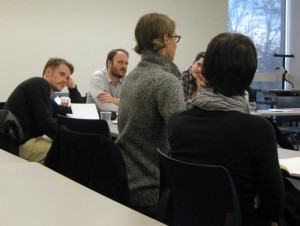 There are many essential aspects of human life that are inherently non-individual, that is, aspects of life that individuals depend upon but that no individual alone could ever define, create or maintain.
There are many essential aspects of human life that are inherently non-individual, that is, aspects of life that individuals depend upon but that no individual alone could ever define, create or maintain. 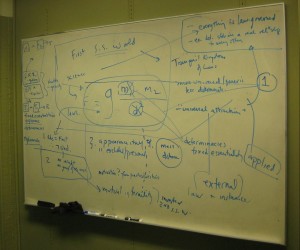 Language is one of most obvious examples of this: minimally, language must be something adopted and developed by at least two people acting together;
Language is one of most obvious examples of this: minimally, language must be something adopted and developed by at least two people acting together;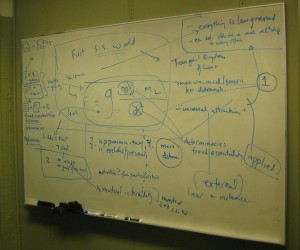
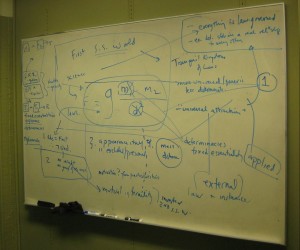 less minimally—and this is the level that we rely upon for our developed lives—language is the work of a massive historical tradition, the result of the shared effort of whole cultures over many generations. There are also other very important realities that are inherently beyond the realm of individual accomplishment.
less minimally—and this is the level that we rely upon for our developed lives—language is the work of a massive historical tradition, the result of the shared effort of whole cultures over many generations. There are also other very important realities that are inherently beyond the realm of individual accomplishment.
Science is likewise a cultural product—a product, that is, of collective work over generations. Our ability to have the knowledge we do—both the results of our scientific endeavours but also the refined methods we rely upon to get those results—is essentially dependent upon the progressive development of the spirit and practice of inquiry, the handing down of those accomplishments to later generations, and—very important—the taking up of that “torch” by those to whom it is handed.
 The arts—music, theatre, dance, painting, sculpture, poetry, and so on—are similarly cultural accomplishments, introduced and refined over generations, and handed down to the later generation for further cultivation.
The arts—music, theatre, dance, painting, sculpture, poetry, and so on—are similarly cultural accomplishments, introduced and refined over generations, and handed down to the later generation for further cultivation.
Language, science and art are phenomena of the whole, that is, though they are all practices enacted by individuals and practices that fulfill the needs of individuals, they are inherently accomplishments of and by a culture.
Language, science and art allow us to see our dependence on a cultural level of accomplishment that makes possible our meaningful lives as individuals.
Government is similarly a matter of necessary action at the level of the whole, but, whereas language, science and art develop culturally without self-conscious direction, government is essentially the way a people as a whole self-consciously organizes and directs itself. Establishing government is acknowledging our need to make decisions and develop structures that are necessary beyond the level of the individual.
 A government legislates: it dictates the terms according to which a community must live. This legislation is evident both in the explicit form of “laws”—specified rules for the form legitimate behaviour can take—and in the implicit form of the institutions established through governmental agency, ranging from the material structures of roads and telephone lines that determine the forms in which bodily action is possible, to the institutional practices of education, health care and policing that shape the ways in which it is possible for people to live. Roads and the traffic laws that govern their use, the harnessing, transmitting and regulating of the use of hydro-electric power, and other such governmental products are all—like language, science and art—essential realities for the lives of individuals that are themselves beyond the level of what could be accomplished by individual agency. This is the essential role of government: to legislate the terms of common life.
A government legislates: it dictates the terms according to which a community must live. This legislation is evident both in the explicit form of “laws”—specified rules for the form legitimate behaviour can take—and in the implicit form of the institutions established through governmental agency, ranging from the material structures of roads and telephone lines that determine the forms in which bodily action is possible, to the institutional practices of education, health care and policing that shape the ways in which it is possible for people to live. Roads and the traffic laws that govern their use, the harnessing, transmitting and regulating of the use of hydro-electric power, and other such governmental products are all—like language, science and art—essential realities for the lives of individuals that are themselves beyond the level of what could be accomplished by individual agency. This is the essential role of government: to legislate the terms of common life.
Government and law, then, do not represent restrictions of human freedom: on the contrary, they are what release us to a higher freedom than we could ever have if we lived strictly as individuals. The establishing of law is thus not an imposition upon us, but is what liberates us to live freely.
In the Apology, Socrates at one point refers to the government of Athens as operating illegally. “Now how,” we might ask, “can a government act illegally, since by definition it is the agency that establishes the laws?”
Government is empowered to dictate the terms of life because it is acting for the whole. Whenever, therefore, those in power act in service of any other goal than the needs of the whole, the situation is no longer an enactment of a community’s self-rule—no longer, that is, government at all, properly speaking—but is instead individuals misappropriating power. Similarly, actions of such individuals are not law properly speaking—not the release of a community’s higher capacities through responsible leadership—but enforced rules that, unlike proper laws, are restrictions of human freedom. A government can act illegally, then, when it is not properly living up to its mandate as government, and rules in its self-interest rather in the interest of the whole.
Just as government itself has a defining norm that its actual practice must answer to if it is to be legitimate, so do laws have a proper form that they must take in order to be legitimate—in order, that is, to be laws, properly speaking.
A few aspects of this norm for laws are obvious from the concept of government. It is because the government acts as the will of the people that it has authority, and so laws must, of course, reflect this authority: laws must be reasonable articulations of the structures people need in order to live well. When, on the contrary, terms are dictated by rulers that, for example, are simply an excuse for the use of force, then those terms should not be confused with law: they are violence to which one may well feel the need to conform (in the interest of protecting oneself), but they have no intrinsic authority and thus cannot call upon any moral imperative that they be obeyed. Similarly, rules put in place in order to channel public resources into private interests cannot command the authority of law, even if individuals find themselves constrained to obey those rules because of the absence of any viable way to resist them.
In addition to these instances of dishonesty in law, however, there are other examples of statutes that can fail to meet the criterion necessary to be a proper law—to be legitimate.
The laws must be coherent, which means obeying the law in one case must not run one afoul of another aspect of law. It is the legislator’s responsibility to ensure that it is possible to obey the law. It cannot be legal, for example, to demand that a person have form A in order to enter office B, and also to demand that one enter office B in order to acquire form A.
The laws must be realistic. Bad laws often take the form of effectively requiring of people that they fail, effectively empowering the use of coercive force against individuals simply by virtue of their acting. Drivers, for example, will always have to blink their eyes, will regularly look in directions other than straight ahead, will be blinding by the setting sun, etc. It is the driver’s responsibility to attend rigorously to the demands of careful and attentive observation, and it is surely legitimate to find one guilty of failing to do this, but it is impossible for drivers always to see everything around them, and a law requiring this would be dishonest, and its application could only be arbitrary, for every driver would always—and necessarily—be failing to “obey” it.
This issue of arbitrariness points to another need: the law must be applied consistently. The law is not just a power handed to an enforcer, but is a rule to which one is to turn in order to know how to live. A rule that says sometimes one thing and sometimes another cannot be relied upon. Whenever, for example, police officers “let someone off the hook,” they are replacing a consistent rule which they are required to enforce with a situation in which the (unpredictable) will of the police officer is the rule to which one must answer. Just as the citizen is required to obey the law, the government is required to enforce it; without uniformity of application, enforcement is unfair, and one cannot act with the assurance that one is in a world where the law in fact applies.
It is also imperative that laws actually be meaningful. If a rule is articulated in a way that involves linguistic, logical or factual sloppiness or error, then, again, that rule cannot properly be called law. A law cannot require, for example, that one “be a good parent and punish one’s children,” for logically fulfilling the first half can (and probably must) be at odds with fulfilling the second half. Again, if one legislates, for example, that citizens can be members of democratic parties but cannot be members of “communist or other totalitarian” parties, then the law is incoherent, since communism (a) is not totalitarian and (b) is democratic. These logical and factual errors make a law nonsense, as would be a law requiring one to “take a chill pill” while waiting in line or “be down with that” when the law-enforcement officer insists that one not run away; and laws about drug use or the portrayals of sex, violence cannot take the form of outlawing “substance abuse,” “explicit language” or “graphic scenes.”
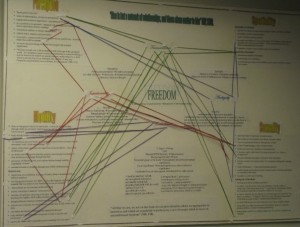 It is not the case that anything a legislator specifies is ipso facto law. Legislating is a matter of competently fulfilling the office of articulating well the rules required for successful cooperative living. These laws must be coherent, they must have their reason in the needs of the community, they must be articulated properly, and they must be consistently enforced.
It is not the case that anything a legislator specifies is ipso facto law. Legislating is a matter of competently fulfilling the office of articulating well the rules required for successful cooperative living. These laws must be coherent, they must have their reason in the needs of the community, they must be articulated properly, and they must be consistently enforced.
In short, as Sophocles’ Antigone insists, there is a standard of right action beyond what a group of legislators happen to say. While there is no magic access to this ultimate good, it is this “call” to which laws must answer. Law-making is ultimately a matter of proper description of the lived needs of communal life: it must be honest about the imperative, accurate in its assessment of the nature and needs of the community, and competent in its articulating of its policy.


 Participants in these
seminars consistently have the experience of growth in their conversation and
conceptual abilities, and typically leave with a transformed sense of the nature
and possibilities of philosophy.
Participants in these
seminars consistently have the experience of growth in their conversation and
conceptual abilities, and typically leave with a transformed sense of the nature
and possibilities of philosophy.





3 Comments
I really love it when you talk about politics. Your post on debt a couple months back was really amazing.
However, I wanted to say that while I enjoyed it, perhaps the phenomenon of laws above doesn’t really correspond to reality. Perhaps that is part of an intended critique of modernity and politics, but that is another issue. As a theoretical issue, I would just point out that people like Carl Schmitt, Benjamin, and Derrida (perhaps just following that one line of thought) consistently talk about the non-universality, the incoherence, and contradictory nature at work in laws… in reality or by its very nature. For them law is the very thing that cannot be made into a rule, but is the exception.
Maybe this merely separates the concept of law versus the forces that authorizes the law. But I would want to add that perhaps the force that authorizes the law, that over-asserts its authority (if it can do anything but), can never be separated from the laws themselves.
Just my two cents and casual thoughts. But best wishes and really love the reading.
I hope some of my students will read this. This week I taught a class, with some difficulty, on the topic of how law (not just any prescribed “law,” but the true law you describe here) is a condition of our ability to function as agents and act in a way that is meaningfully human. The challenge, I think, was to bring students to a point where they could understand that law is first and foremost not a matter of voluntarism–it is not simply simply something that someone (a majority, a tyrant, etc.) chooses to legislate and enforce, law that is written down. In reading this, I can clearly see that while competent and responsible collective decisions are absolutely necessary to shape and guard the law, that these decisions themselves are not the real sources of law. It seems to me that this constitutional principle of the law remains largely unwritten and unspoken: that our freedom to consent to and self-consciously effectuate law can only grow from the inherited soil of our shared, consistent lawfulness. It seems that there has been a lot of political rhetoric that pays lip service to this idea. But instead of acknowledging our debt to the real sources of law, the shared fabric of humanity effected by language, science, art, religion and other spheres of collective life, this rhetoric often draws the conclusion that “freedom isn’t free” but requires accepting limitations of the true law, with “laws” that undermine legal transparency, curtail individual privacy, are inconsistently applied (racial profiling, crack cocaine punitive disparity, loitering laws…) or serve to undermine, rather than protect, other conditions of law you have thoroughly laid out here.
I find this post really helpful for my own thinking about law. I go back to it often (like today!).